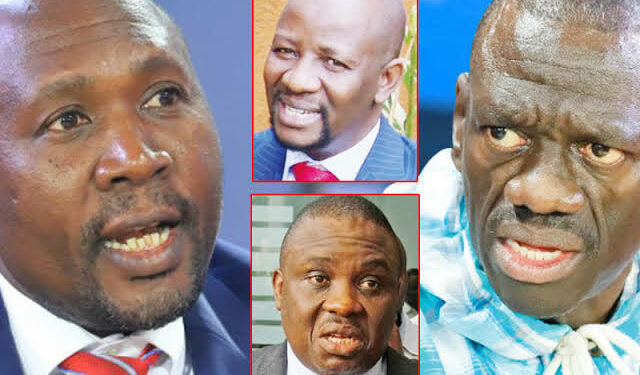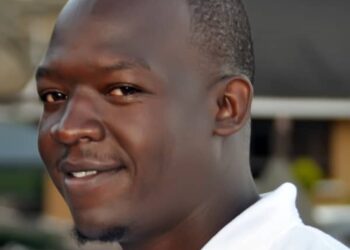A lot has been said and written about the recent fall out in FDC, and it has been painful to watch. I saw Besigye’s press conference where he tried to give some sort of background to the issue – he used a lot of wisdom to seemingly mask most of the rot in the party, and I hope that other leaders of the party start emulating him –they should stop talking carelessly in public.
I again painfully watched Ssemujju Nganda and Nandala Mafabi on national TV, and I felt so betrayed by both of them. Both built their brand by never sugarcoating the truth and saying what must be said, but it was sad to see them accusing each other like little children. There has been a lot of speculation, too, meant to clearly tarnish names of leaders of FDC. Ssemujju, for instance, was speculating on why Nandala allegedly received money from Museveni, and I wondered why.
Saying that the Nandala money was meant to fight NUP doesn’t benefit FDC – It only benefits three people: Semujju himself (if he plans to lure NUP supporters to his side in the next election), Bobi Wine( make him appear like he’s a threat to Museveni), and Museveni( because it makes FDC appear like it’s already in his pocket).
It should be noted that Nandala hasn’t denied receiving the money but he’s yet to mention the source and the reasons for the money. All we know is that money was received before or during the 2020-21 campaigns. Most politicians who receive financial help from some NRMs never reveal their sources to protect them. It was only Bobi Wine who confessed on national TV for having received money from some NRMs to help him become MP of Kyadondo East. He was cornered to confirm this after General Tumukunde and Tamale Mirundi had revealed the same information to the public.
Some unconfirmed media reports have revealed that the money in contention now came from an international donor to both NUP and FDC, and it had to pass via Bank of Uganda, because it was a very large sum of money.
If you have access to money— even if it’s not your money— you are morally responsible for what you decide to spend that money on, and what you decide not to spend that money on. I have a feeling that Nandala spent most of the money received in helping his party during the elections.For instance, I don’t know if people remember this, but FDC nominated more MPs than NUP and paid nomination fees for all of them. So, where did they think all that money came from? If it all came from party accounts, then FDC must be really a rich party.
There are three things people should know about life: what you desire, what you believe and what you should do. Regardless of whether NUP was created by Museveni, its leaders and followers turned a lot of FDC and UPC supporters into Museveni supporters before voting took place – people just wanted Museveni to win and for NUP to be put in its place. So, it was tempting for anyone in that category, including Nandala, to receive any help from Museveni if it meant to weaken the NUP.
Obviously, it’s Museveni who benefits from all these situations. He gets to reduce the popularity of something he created as a fake opposition in 2004 by sponsoring another party, or some individuals to fight it. And if it’s true that he’s the one that gave Nandala the shs.7 b, then he has already made a good ‘profit’ on his investment considering the ongoing public outbursts among the FDC leaders.
Obviously, the current problems at FDC extend beyond internecine struggle. A lot of FDCs attacking the party president, Patrick Amuriat, and Nandala wouldn’t be doing so if the party was doing well on the ground. The resurrection of NUP, a party that’s as old as FDC, directly affected the latter (FDC) tremendously in the 2020-21 elections.
MOLES
That said, we cannot rule out that Museveni had infiltrated FDC and other parties before the elections. It’s a well-worn aphorism that Museveni has eyes and ears in almost all political parties in Uganda. Infiltration is the action of entering or gaining access to an organization or place surreptitiously, especially in order to acquire secret information or cause damage. I’m loath to speculate about circumstances under which government agencies might choose to infiltrate a political party.
In Uganda, as far as I know, it is not illegal to infiltrate a political group as long as you do not break any laws. If you are able to find out inside information to give to your own party, that is not against the law.
Words have meanings. A “mole” has a meaning, and while Nandala and Amuriat are seemingly corrupt, self-serving, narcissistic obstructionists, that doesn’t make that an accurate label for them. In guessing a mole, you can only work with what you know and calculate, and you might be wrong. But do try, nonetheless.
Moles find it so easy to blend in and avoid detection in any political organization in Uganda. In Uganda, people only try to detect moles by their tribes though this may not necessarily give actual results. Someone can be a Munyankole in DP or NUP but not necessarily a mole, but a Muganda may be a mole in both parties.
You can’t detect a mole by their actions as Besigye said at his recent press conference. The most successful spying is performed by those who are never revealed. Interestingly, a lot of Ugandans ignorantly think that a mole in opposition is the one who criticises their leader. An actual agent is supposed to play nice in order to get close to the leader.
However, if you ask me, most political parties do themselves no favours in this area. They don’t do adequate vetting while recruiting people who work at their headquarters, or those standing for elective posts in and outside the parties. For instance, FDC can easily endorse one as their candidate if one can raise the shs. 3m required nomination fee. It’s almost the same in other parties. In NUP, party tickets were reportedly being sold at astronomical prices by party officials before the 2020-21elections. All NRM needed to do was to pay the ‘’bribe’’ money, nomination fee and campaign money for most potential NUP ‘recruits’ in order to control most of the party.
That is how the KGB, too, partly managed to infiltrate both the MI6 and the CIA during the cold war. Both intelligence agencies did not conduct adequate vetting for their employees during the early Cold War. This was especially the case with MI6 – the KGB exploited MI6’s penchant for recruiting from elitist top British universities such as Oxford and Cambridge by getting their intelligence officers to recruit people at these universities as agents and then getting these agents to join MI6 as intelligence officers. This was the case with Kim Philby and the Cambridge Five. Philby was the biggest traitor MI6 ever had. He exposed countless intelligence officers, agents and operations etc. He also jeopardised MI6’s relationship with the CIA.
Ugandans should also stop attacking people in NRM especially if they aren’t hurting you directly. There are obviously so many people that are in NRM but sympathising with some in opposition. Similarly, there were a lot of people that worked for Hitler but were also trying to bring him down. German spies were generally agents of the Abwehr- German military intelligence, and the Abwehr was run by Admiral Wilhelm Canaris, secretly an anti-Nazi and a member of the conservative resistance. He purposely staffed his organisation with people opposed to the Hitler regime and agents were implicitly or explicitly encouraged to defect or get caught at the earliest convenience; spies who were loyal to the Third Reich were prone to being sold out. Canaris was reportedly in direct contact with British intelligence throughout the war and may have had a hand in orchestrating the assassination of his former protege Reinhard Heydrich, who was onto him and building a case against him.
The Soviets, on the other hand, made no such error which is why they were more successful. Russian spies were famously involved in the allied atomic bomb project such that there is a story that when US president then, Harry Truman, hinted about the new weapon that Stalin showed little surprise.
So, everybody is useful during a struggle one way or the other if they are willing to help. If you receive money from Museveni or an NRM, and put it to good use, I don’t see any problem with it under the current circumstances. Good use shouldn’t mean buying bullet proof cars, houses abroad, e.t.c, but things to help the cause or the needy.
Do you have a story in your community or an opinion to share with us: Email us at editorial@watchdoguganda.com













